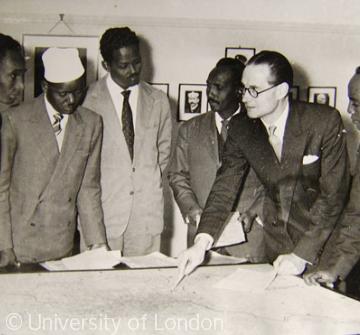Somalis

Somalis have come to British ports as seamen since at least the 19th century, but their presence in Bristol cannot be documented before1950. Perhaps only around 10 Somali men were working as general labourers in the city in 1960, when the British and Italian colonies on the Horn of Africa merged into an independent Republic of Somalia. Small numbers of marriage partners and other workers joined them, so that a community of around 100 people had been established by 1989.
Yet two years later this number is estimated to have jumped to 2,000. This sudden increase was caused by the collapse of Somalia into civil war in 1991. The Soviet-style regime of Dictator Siyad Barre, who had seized power in the military coup of 1969, was finally toppled after over a decade of clan-based infighting. In the murderous chaos that ensued, some clans in the north-west of the country (formerly under British rule) grouped together to declare the secession of an independent Republic of Somaliland, based on traditional clan structures. Although unrecognised by the international community, Somaliland has enjoyed relative peace and stability since 1997. By contrast, the rest of the country and the surrounding border areas in Kenya and Ethiopia, where ethnic Somalis reside, have descended into barbarous war-lordism. Even in the cities, basic services have been destroyed and rape and murder are routinely perpetrated by ‘khat-chewing young gangsters’ in a spiral of factionalism. The 1990s saw up to one third of Somalis facing starvation and the displacement of a million of the six million population. Some of them managed to escape to Europe, despite ever-tightening restrictions on immigrants and refugees. By 2001 as many as 10,000 Somalis had come to Bristol. Six years later the estimated number of Somalis in Bristol had doubled. Although ‘push’ factors clearly outweigh ‘pull’ factors in such extreme circumstances, some respondents expressed a preference for Britain over other European countries because of the historical links and the status of English as an international language. The existence of family networks was another draw, with Bristol preferred to Bath, for example, because of its ethnic diversity.
An estimated 16,000 Somalis now live in Bristol. Concentrated mainly in the Easton, Eastville, Barton Hill and Horfield areas, they have become a focus for public attention and sometimes hostility in the city.
Content generated during research for the paperback book 'Bristol: Ethnic Monorities and the City 1000-2001' (ISBN 13 : 978-1-86077-477-5 ) for the England's Past for Everyone series



